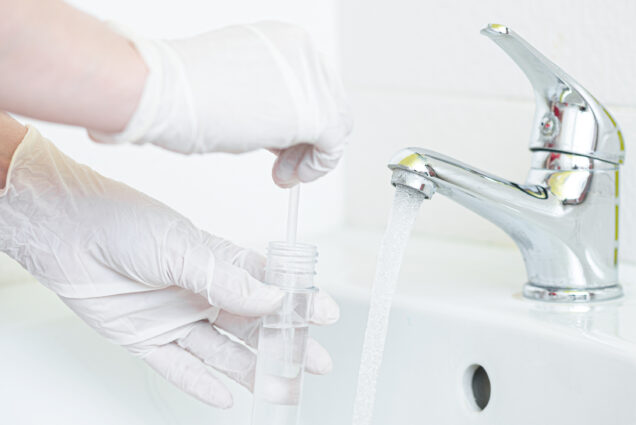Well inspections and routine well water testing are essential for keeping your household water safe and dependable. Many Connecticut homes rely on private wells for drinking water, and these systems can experience changes over time that may affect water quality. A regular inspection and testing schedule helps identify early issues and gives homeowners peace of mind that their water remains safe for daily use.
During a professional well inspection, a trained technician evaluates the condition of the visible well structure, surrounding ground and visible components. The goal is to identify cracks, damage, poor drainage or anything that could allow bacteria or surface water to enter the well. The pump, pressure tank and related equipment are also checked to confirm that they are functioning properly and providing steady water flow.
Water testing is another important part of maintaining well safety. Complete tests can reveal bacteria, minerals, pH changes, heavy metals and other contaminants that may affect taste, appearance or overall health. Because water conditions can shift after heavy rain, seasonal changes or normal system wear, Connecticut homeowners are encouraged to test their well water throughout the year to ensure consistent quality and safety.
Assessment and Inspection
Regular well inspections are an important part of keeping your water clean and dependable. Connecticut’s seasonal changes can influence groundwater levels, soil conditions and the overall performance of a private well system. A complete inspection helps identify early signs of trouble and protects your home from unexpected changes in water quality.
A professional assessment begins above ground. The technician reviews the well location to confirm that it is properly graded and protected from surface runoff or nearby sources of contamination. The wellhead and visible casing are then examined for any cracks, leaks, corrosion or loose fittings that could allow outside water or bacteria to enter the system. These components must remain sealed and structurally sound to keep the well protected.
Water quality is also a key part of the inspection process. Testing can reveal bacteria, minerals, pH changes and other indicators that help determine whether the water is safe for daily use. Regular inspections and water testing give homeowners a clear understanding of their well’s condition and allow potential problems to be addressed before they become more serious. Staying proactive is one of the most reliable ways to protect your household’s water supply.
Maintenance and Reporting
During a well inspection, the pump and pressure tank are checked to make sure they are operating safely and delivering steady water flow throughout the home. These components work together to keep your water system running reliably, so the technician looks for leaks, cracks, rust or any other signs of wear that could affect performance. The inspection also includes a review of the water pressure, since seasonal changes in Connecticut can influence how well a private well system functions.
If water testing shows the presence of bacteria or other contaminants, the next step is disinfection. This process uses a controlled treatment to eliminate harmful microorganisms and restore the safety of the water. After the system has been disinfected and retested, the technician confirms that the water meets safe standards for household use.
Once the inspection and testing are complete, homeowners receive a detailed report that explains the condition of the well system. This report summarizes the inspection findings, outlines the results of the water tests and includes recommendations for repairs, routine maintenance or follow-up testing if needed. Staying consistent with inspections and water testing helps keep a well system efficient and ensures that the water remains safe for everyday use.
Importance of Regular Well Inspections
Regular well inspections are one of the most reliable ways to protect the safety and quality of your drinking water. Connecticut homeowners are encouraged to schedule a full inspection at least once a year, since groundwater conditions, seasonal changes and natural wear can all affect the health of a private well. Homes located near farmland, older septic systems or areas with known water concerns may benefit from more frequent evaluations.
Consistent inspections can help or may help prevent health issues that can arise from contaminated water and allow early problems to be corrected before they lead to costly repairs. When annual inspections are paired with routine water testing, homeowners gain a clear and accurate understanding of how their well system is performing and whether the water remains safe for daily use.
Regular inspections and water testing provide long-term protection, peace of mind and a more dependable water supply. By working with trained professionals who understand how Connecticut well systems respond to seasonal and environmental changes, homeowners can keep their well operating safely and confidently throughout the year.
Why Connecticut Homeowners Choose Greco and Haines
Greco and Haines has served Connecticut homeowners since 1963, providing dependable well inspections and water testing supported by decades of local experience. Our technicians understand the unique conditions that affect private wells across the state and evaluate each system with care and accuracy. We provide complete inspections, water quality testing, pump evaluations and maintenance recommendations to help homeowners stay informed and confident about their well system.
Every inspection follows industry best practices and includes a clear written report so you know exactly what was found and what steps, if any, should be taken next. As a locally based family owned company, we respond quickly and offer reliable service seven days a week to homes throughout New Haven, Fairfield, Hartford, Litchfield, Middlesex and surrounding counties. We take pride in helping families maintain safe, clean and dependable water supplies.
Whether you need a routine inspection or guidance on improving your water quality, our team is here to help and ready to provide the professional support you expect from a long-standing Connecticut well company.
For more information about our well water services in CT, contact us today via our online contact form or call any time! 203-735-9308 or 203-777-2256 or Call Toll-Free from any CT Area Code 1-800-922-2958.

